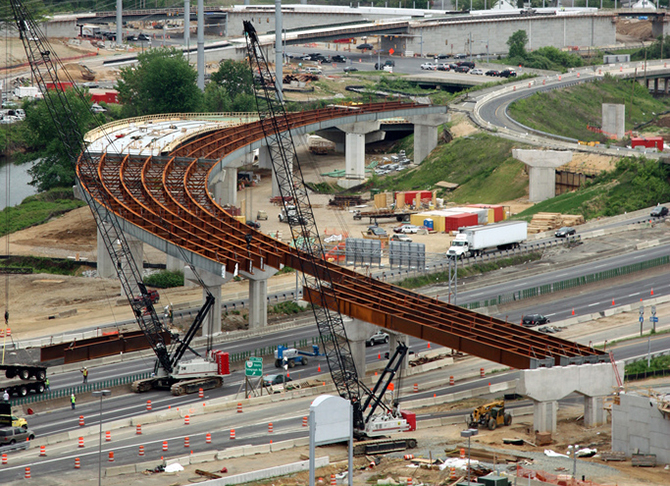Despite the occasional feature story about America's "infrastructure crisis" and the campaign platforms for increased investment, the "era of big infrastructure is over," argues University of Minnesota engineering professor David Levinson at the Transportist.

With maintenance a more pressing need than expansion, Levinson does not foresee major additions to either the highway system or rail and transit networks in the years ahead:
Once upon a time we did deploy big infrastructure. The railroads in the 19th century, and the interstate in the 20th were BIG. Turnpikes and canals were other large technical systems of the 19th century, as were the US Highway system, airports, container ports, and the like in the 20th. But they have been deployed, and many of them are already shrinking.
Instead, because the existing infrastructure systems are mature (built out), they need little expanding (and likely some contracting).
Certainly there are potential new infrastructure for surface transport. The most widely discussed would be intercity High Speed Rail and urban transit projects. Similarly there are proposals for water (rebuilding the water and sewer networks) and for energy (massive investment in renewables as well as smart grid technologies). I think the transport investments are unlikely, the water investments are mostly piecemeal replacements, and the energy investments will be a set of many small, decentralized power generators rather than large facilities. In short change is likely to [be] incremental rather than comprehensive.
Proposals for new Interstates appear from time to time (like this for I-87: [10 points if you knew that was Norfolk to Raleigh without looking it up]), and occasionally one actually opens, and even a second or rejuvenated Interstate 2.0 system has been proposed, but again there is no strong push for such a thing, and the advent of new technologies gives such proposals a ghost-like feel.
There are new systems emerging. The internet and wireless telecommunications are pretty important. Combine these with transport and we can construct an on-call ride-hailing system that has updated the traditional taxis. This may eventually become substantial with Autonomous Vehicles. But this latter element is not a conventional physical infrastructure investment (not much of one, some servers, some software), rather it redeploys existing (and soon new) vehicles in a useful way.
Elsewhere on the Network today: Urban Cincy reports that Mayor John Cranley's $109 million "capital acceleration plan" completely ignores the city's bike policy. Green City Blue Lake looks at survey data about how people decide between driving, biking, walking, or transit. And Bike SD writes that decision makers may leave a a huge hole in the middle of San Diego's bike network for the sake of preserving 12 parking spaces.





